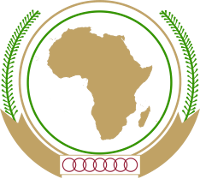The African Union
The African Union is a 55-member body that looks to address issues common to all African nations. 
Member states founded the African Union (AU) on May 26, 2001, in Addis Ababa, Ethiopia, and its operations began the following year, on July 9, 2002, in Durban, South Africa. Egyptian President Hosni Mubarak was the first head of the African Union. The Ethiopian capital is the political center of the AU. Most of the body's important decisions are made as a result of a semi-annual meeting of the heads of state called the Assembly of the African Union, which meets once a year. A head of state from of the member states serves as the Chairperson of the AU for a year. The chairperson represents the AU at international meetings, including the G-8 and the G-20. The post rotates among the continent's five geographic regions: Central, Eastern, Northern, Southern, and Western. The members of each geographic region are these:
The AU also has these other official bodies:
The AU had its origins in previous pan-African organizations, including the First Congress of Independence African States, in 1958; the Organization of African Unity, founded in 1963; and the African Economic Community, founded in 1981. |
|
Social Studies for Kids
copyright 2002–2024
David White




